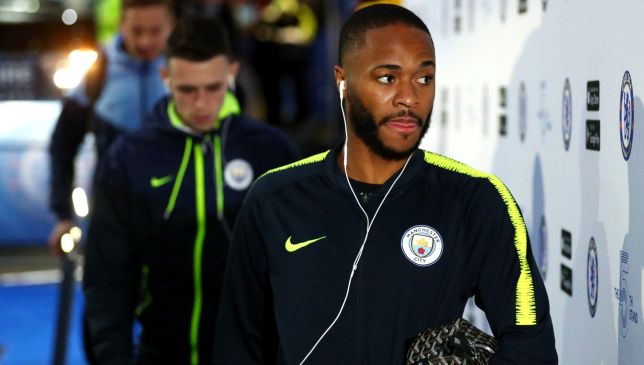
Given how compelling viewing Jamie Carragher and Gary Neville have become on Sky Sports’ Monday Night Football, it was no surprise that this week, the duo addressed Manchester City star Raheem Sterling‘s powerful statement on racism in response to abuse he received from Chelsea fans on Saturday.
Carragher and Neville both shared their personal experiences with Sterling, the former from his time as the player’s teammate at Liverpool and Neville from when he was Sterling’s coach in the England set-up.
The ex-Liverpool man addressed the unfair media coverage of Sterling head-on, pointing out that his recollection of the star – quiet, humble – was a far cry from the flashy kid British tabloids have portrayed.
Meanwhile, Neville acknowledging that his response to Sterling confiding to him during Euro 2016, about the abuse he was facing then, was inadequate, a commendable standpoint.
The former Manchester United star has seemingly been facing a personal reckoning in the short time since Sterling’s statement, and he followed up with a telling comment regarding the abuse former white teammates like Paul Gascoigne, David Beckham, and Wayne Rooney faced, compared to what another ex-teammate, Ashley Cole, went through.
Cole, like Sterling, started seeing abuse the moment he made an acrimonious transfer and also like Sterling, never saw the vitriol go away, no matter how well he played after leaving Arsenal for Chelsea.
“It was horrific, the stick, the vilification they got, when it was bad, or when they made mistakes,” Neville said of Rooney, Beckham – who had effigies of him burned after the 1998 World Cup – and Gascoigne.
“But do you know, when it was good for them, they were hero-worshipped. When it’s good for Ashley Cole or Raheem Sterling, they can’t get the hero worship.”
It was perhaps the most impactful moment of the show.
Throughout the debate, the candour from Neville and Carragher, their willingness to question themselves, and each other, was encouraging. Neville, for example, countered his colleague’s statement that there were “undertones of racism” with regards to Sterling’s treatment in the media, saying it was “blatant.”
Yet, at the same time, it felt like the duo, along with presenter David Jones, and Sky Sports itself, fell short of producing what could have been a seminal moment for the discussion of racism on mainstream English football television.
It should have seemed incongruous, for example, that the debate featured only three white men, progressive though they may be.
Liverpool legend John Barnes was invited onto BBC Breakfast. Stan Collymore, who has always been outspoken about the racism he faced as a player, and still exists in the game today, wrote a column for the Guardian.
Rio Ferdinand has been similarly vocal. Eni Aluko, who is combining punditry with her playing duties with Juventus, has been involved in a high-profile racism scandal as recently as this year.
Shola Ameobi and Matt Murray addressed the Sterling controversy on Sky Sports itself, a day earlier, during their Sunday match coverage – with Jones the presenter, and on that occasion, doing Ameobi and Murray the courtesy of asking them about their experiences with racism.
Could none of them have been invited to be a part of this conversation? Yes, it would have been a departure from MNF’s usual format, and in the case of Ferdinand, a BT Sport pundit, and Aluko, an active player, it may have been difficult to arrange.
But given that the show’s producers knew from Saturday night that this would be a talking point, the inability to provide a more inclusive discussion is galling.
As was Neville and Carragher’s failure to mention incidents they’ve indirectly been involved in. Neville was a teammate of Ferdinand’s during the storm surrounding the centre-back’s brother, Anton Ferdinand, and John Terry – accused of saying the exact same phrase allegedly uttered by the Chelsea fans this weekend.
Carragher was even more directly a part of the scandal which erupted when his then-teammate, Luis Suarez, was suspended for racially charged comments directed at Manchester United’s Patrice Evra – another former teammate of Neville’s.
Both Carragher and Neville have also been teammates of players like Paul Ince, England’s first-ever black captain, Andy Cole, and Les Ferdinand, all of whom have spoken about the racism they faced.
Instead, both focused only on incidents when they could forge a direct, personal connection – Sterling confiding in Neville and being a former teammate of Carragher’s, Ashley Cole sitting next to Neville in the England dressing room.
It was a start, sure, but it also seemed like an opportunity missed, and as much an exercise in assuaging personal guilt as addressing the issue at hand.
Clearly, Neville and Carragher, throughout their careers, have been around people who have experienced racism their whole lives.
That they, as white men, could only address racism from a perspective where they could put themselves close to the centre of it, is not an adequate response. Not when their show is often held up as the gold standard of British football punditry.